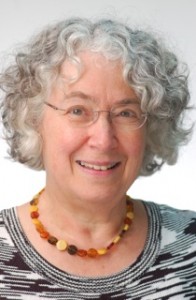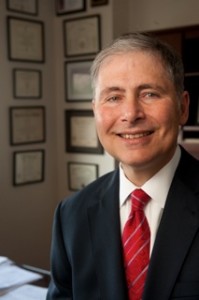sparks optimism for the future of cancer treatment
by Sarah Hansen
The 18th annual “A Look Ahead” Symposium happened Wednesday, April 15, 2015 in UMBC’s University Center Ballroom. The symposium brought together UMBC faculty, students, and alumni, as well as regional leaders in industry and research. The theme of this year’s event was “Explorations in Transformative Research,” with a focus on novel cancer treatments. Two dynamic and decorated speakers headlined the program: UMBC Professor of Biological Sciences Suzanne Ostrand-Rosenberg and Georgetown Lombardi Comprehensive Cancer Center Director Louis Weiner. Poster sessions highlighting faculty and graduate student research at UMBC bookended the talks and offered networking opportunities.
The UMBC College of Natural and Mathematical Sciences hosted the symposium. Dean Bill LaCourse emphasized that “the success of UMBC really centers from the talent and dedication of its faculty,” as he introduced Ostrand-Rosenberg. Her accolade collection includes the American Association of Immunologists Excellence in Mentoring Award, and “many alums attribute their success to her,” said LaCourse.
“In order to appreciate where we are today with immunotherapy, we’ve got to go back in time,” said Ostrand-Rosenberg, who started her talk by describing “magic bullets” suggested by scientist Paul Ehrlich in 1906. He was the first to suggest targeted therapies for disease. In Ehrlich’s time the concept was popular, but one experiment in the 1950s seemed to debunk his ideas. “It took the whole field out of the picture,” said Ostrand-Rosenberg. Fortunately, immunotherapy was revived in the 1990s, and “there’s now a tremendous amount of enthusiasm for mobilizing the immune system against cancer,” she said.

Suzanne Ostrand-Rosenberg, Professor of Biological Sciences at UMBC
Ostrand-Rosenberg described two avenues researchers are exploring for destroying cancer. Antibodies are a class of proteins that can be engineered to specifically bind cancer cells. They can deliver a drug or mark cancer cells for destruction. T-cells are immune cells that “can go from one tumor cell to another and just zap them,” said Ostrand-Rosenberg. There are 17 FDA-approved antibody treatments currently available. No T-cell treatments are approved yet, but several clinical trials have shown impressive responses to these novel therapies—often in cancer types that were previously untreatable.
Most cancerous cells are destroyed by the immune system before becoming dangerous, but “cancer cells are clever cells,” Ostrand-Rosenberg said. They can repress the immune system or even coopt it to promote their own growth. Sometimes, “All the good-guy cells are suppressed,” she said. Researchers, including Ostrand-Rosenberg, are tackling the challenge of preventing immune repression by cancer cells, and they’re making good progress.
Weiner comes at cancer from a different perspective. As a clinical oncologist, he knows how it feels to tell a patient there’s nothing he can do: heart-breaking. He also knows how cancer prognoses are made. “We’re gamblers in white coats when we see patients,” he said, because there are still no tests that can reliably determine when a cancer will be cured by surgery, for example, or when it will require additional treatment. Chemotherapy and radiation are standard practice, but they are not specific to cancer cells and produce debilitating side effects.

Louis Weiner, Georgetown Lombardi Comprehensive Cancer Center Director
Weiner agreed with Ostrand-Rosenberg that patients’ own immune systems could be our best weapon against cancer. A cancer cell’s biggest fear isn’t chemotherapy or radiation treatment, but rather, “There’s a T-cell that that wants to kill me,” he said. He and his collaborators are running experiments to identify genes that, when activated, can promote or hinder a cancer cell’s survival. Some of these genes code for molecules on a cell’s surface that tell immune cells there’s “nothin’ to see here, folks.” Learning more about how cancer cells evade destruction by the immune system will help researchers develop targeted treatments. Tests that detect these “you don’t see me” molecules would also help clinicians select appropriate treatment regimes.
Weiner is optimistic about the future of immunotherapy. “We can win this war on cancer, and I think we now have the tools for the first time,” he said. Ostrand-Rosenberg and Weiner are making strides toward replacing archaic, non-specific treatments for cancer with more effective and less traumatic techniques.
Dean LaCourse lauded the speakers for their work. “Cancer is a scourge, and it’s researchers like the people we have on stage today that are making progress in that fight,” he said. Audience members at “A Look Ahead” walked away with inspiration and enthusiasm for joining the fight themselves.
The 18th annual “A Look Ahead” Symposium happened Wednesday, April 15, 2015 in UMBC’s University Center Ballroom. The symposium brought together UMBC faculty, students, and alumni, as well as regional leaders in industry and research. The theme of this year’s event was “Explorations in Transformative Research,” with a focus on novel cancer treatments. Two dynamic and decorated speakers headlined the program: UMBC Professor of Biological Sciences Suzanne Ostrand-Rosenberg and Georgetown Lombardi Comprehensive Cancer Center Director Louis Weiner. Poster sessions highlighting faculty and graduate student research at UMBC bookended the talks and offered networking opportunities.
The UMBC College of Natural and Mathematical Sciences hosted the symposium. Dean Bill LaCourse emphasized that “the success of UMBC really centers from the talent and dedication of its faculty,” as he introduced Ostrand-Rosenberg. Her accolade collection includes the American Association of Immunologists Excellence in Mentoring Award, and “many alums attribute their success to her,” said LaCourse.
“In order to appreciate where we are today with immunotherapy, we’ve got to go back in time,” said Ostrand-Rosenberg, who started her talk by describing “magic bullets” suggested by scientist Paul Ehrlich in 1906. He was the first to suggest targeted therapies for disease. In Ehrlich’s time the concept was popular, but one experiment in the 1950s seemed to debunk his ideas. “It took the whole field out of the picture,” said Ostrand-Rosenberg. Fortunately, immunotherapy was revived in the 1990s, and “there’s now a tremendous amount of enthusiasm for mobilizing the immune system against cancer,” she said.
Suzanne Ostrand-Rosenberg, Professor of Biological Sciences at UMBC
Ostrand-Rosenberg described two avenues researchers are exploring for destroying cancer. Antibodies are a class of proteins that can be engineered to specifically bind cancer cells. They can deliver a drug or mark cancer cells for destruction. T-cells are immune cells that “can go from one tumor cell to another and just zap them,” said Ostrand-Rosenberg. There are 17 FDA-approved antibody treatments currently available. No T-cell treatments are approved yet, but several clinical trials have shown impressive responses to these novel therapies—often in cancer types that were previously untreatable.
Most cancerous cells are destroyed by the immune system before becoming dangerous, but “cancer cells are clever cells,” Ostrand-Rosenberg said. They can repress the immune system or even coopt it to promote their own growth. Sometimes, “All the good-guy cells are suppressed,” she said. Researchers, including Ostrand-Rosenberg, are tackling the challenge of preventing immune repression by cancer cells, and they’re making good progress.
Weiner comes at cancer from a different perspective. As a clinical oncologist, he knows how it feels to tell a patient there’s nothing he can do: heart-breaking. He also knows how cancer prognoses are made. “We’re gamblers in white coats when we see patients,” he said, because there are still no tests that can reliably determine when a cancer will be cured by surgery, for example, or when it will require additional treatment. Chemotherapy and radiation are standard practice, but they are not specific to cancer cells and produce debilitating side effects.
Louis Weiner, Georgetown Lombardi Comprehensive Cancer Center Director
Weiner agreed with Ostrand-Rosenberg that patients’ own immune systems could be our best weapon against cancer. A cancer cell’s biggest fear isn’t chemotherapy or radiation treatment, but rather, “There’s a T-cell that that wants to kill me,” he said. He and his collaborators are running experiments to identify genes that, when activated, can promote or hinder a cancer cell’s survival. Some of these genes code for molecules on a cell’s surface that tell immune cells there’s “nothin’ to see here, folks.” Learning more about how cancer cells evade destruction by the immune system will help researchers develop targeted treatments. Tests that detect these “you don’t see me” molecules would also help clinicians select appropriate treatment regimes.
Weiner is optimistic about the future of immunotherapy. “We can win this war on cancer, and I think we now have the tools for the first time,” he said. Ostrand-Rosenberg and Weiner are making strides toward replacing archaic, non-specific treatments for cancer with more effective and less traumatic techniques.
Dean LaCourse lauded the speakers for their work. “Cancer is a scourge, and it’s researchers like the people we have on stage today that are making progress in that fight,” he said. Audience members at “A Look Ahead” walked away with inspiration and enthusiasm for joining the fight themselves.
Tags:
Posted: April 21, 2015, 5:55 PM
